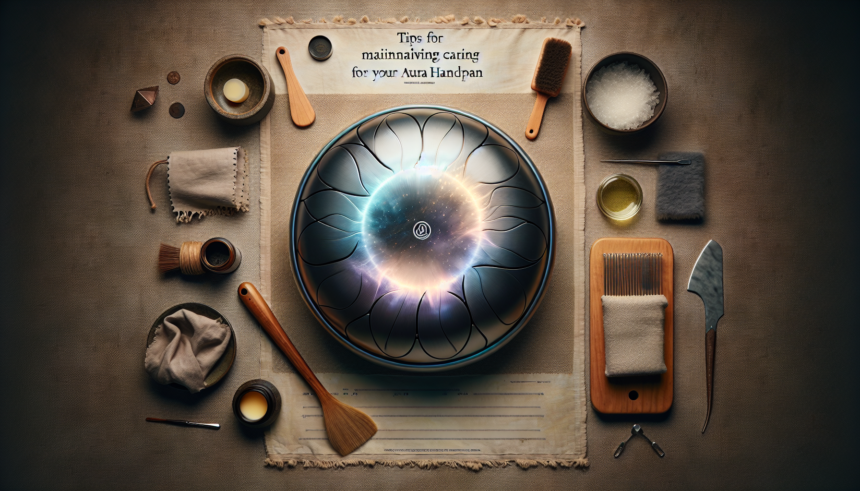<!DOCTYPE html>
<html lang="en">
<head>
<meta charset="UTF-8">
<meta name="viewport" content="width=device-width, initial-scale=1.0">
<title>Tips for Maintaining and Caring for Your Aura Handpan</title>
<style>
body {
font-family: Arial, sans-serif;
line-height: 1.6;
margin: 0;
padding: 20px;
max-width: 800px;
margin: auto;
}
h2 {
color: #333;
}
p {
margin-bottom: 20px;
}
ul {
list-style-type: disc;
margin-left: 20px;
margin-bottom: 20px;
}
</style>
</head>
<body>
<h2>Introduction</h2>
<p>The Aura Handpan is a unique musical instrument known for its ethereal sound and captivating presence. As a piece of art and a musical companion, it's pivotal to ensure it receives proper care and maintenance. By treating your handpan with respect and consideration, you not only preserve its appearance but also ensure it resonates optimally for years to come.</p>
<h2>1. Handling Your Handpan with Care</h2>
<p>One of the most vital aspects of caring for your handpan is handling it with care. When moving or playing your handpan, ensure that your hands are clean to prevent residue and oils from transferring onto the surface. It is preferable to use a soft, clean cloth to wipe down your handpan periodically, so as to remove any oils or dirt.</p>
<ul>
<li><strong>Using Proper Stands:</strong> Always set your handpan on a secure and stable surface. When you’re not playing, utilize a stand or carry bag designed specifically for handpans to avoid contact with rough surfaces.</li>
<li><strong>Avoiding Harsh Impact:</strong> Given its delicate structure, strong impacts can change the tuning or even cause dents. Play with a gentle touch and avoid dropping or knocking the instrument.</li>
</ul>
<h2>2. Environmental Considerations</h2>
<p>The handpan material is susceptible to changes in the environment. Be mindful of the conditions in which you place your handpan as temperature fluctuations and humidity changes can affect its sound and physical condition.</p>
<ul>
<li><strong>Temperature Fluctuations:</strong> Do not expose your handpan to extreme temperatures. Keep it in a climate-controlled space whenever possible.</li>
<li><strong>Humidity Levels:</strong> Maintaining a moderate humidity level (around 40-60%) is advised. Too much moisture can create rust, while too little can cause metal stress.</li>
<li><strong>Indirect Sunlight:</strong> Prolonged exposure to direct sunlight could damage the finish and impact the sound quality.</li>
</ul>
<h2>3. Regular Cleaning Routine</h2>
<p>Establishing a regular cleaning routine is crucial to your handpan’s longevity. Secure a non-abrasive cloth and a gentle cleaning solution to wipe down your handpan. Steer clear of products with harsh chemicals that might strip the instrument’s finish.</p>
<ul>
<li><strong>Remove Moisture:</strong> Always dry your handpan thoroughly after cleaning or playing to prevent rust.</li>
<li><strong>Use Protective Oil:</strong> Periodically, application of a thin layer of protective oil can safeguard the surface against rust. Use a non-reactive oil specifically made for instruments.</li>
</ul>
<h2>4. Tuning and Repairs</h2>
<p>With regular use, your handpan might require tuning or repairs. However, it is recommended not to attempt tuning or repairs on your own unless you are experienced, as improper handling can worsen the damage.</p>
<ul>
<li><strong>Seek Professional Help:</strong> For tuning, seek the assistance of a professional who understands the nuances of the handpan.</li>
<li><strong>Minor Repairs:</strong> Should you encounter minor dents, consult a professional to assess if repair is needed and feasible.</li>
</ul>
<h2>5. Proper Storage</h2>
<p>When not in use, store your handpan in a protective case. This will reduce exposure to dust, accidental bumps, and changes in environmental conditions.</p>
<ul>
<li><strong>Use of Cushioned Bags:</strong> A well-cushioned bag ensures your handpan is safe during transport. Always secure the bag tightly to prevent movement inside.</li>
<li><strong>Avoid Overcrowding:</strong> Store your handpan in an area where it won't be jostled or compressed by other objects. Avoid stacking other items on top.</li>
</ul>
<h2>6. Emotional and Energetic Care</h2>
<p>Beyond the physical, maintaining a strong emotional and energetic bond with your handpan is rewarding. Frequently play, engage, and connect with it to help maintain and even improve the sound over time.</p>
<ul>
<li><strong>Regular Practice:</strong> Use regular practice to explore the possibilities of your handpan, enhancing both your technique and your instrument's vitality.</li>
<li><strong>Meditative Sessions:</strong> Incorporating meditative playing sessions fosters a deep connection, enhancing your overall musical journey.</li>
</ul>
<h2>Conclusion</h2>
<p>Caring for your Aura Handpan involves both physical maintenance and emotional engagement. By making conscious choices about handling, environment, cleaning, tuning, storage, and practice, you ensure longevity and sustained quality performance of this beloved instrument. With meticulous care, you can preserve the rich, harmonious sounds of your handpan, allowing it to continue to serve as a source of joy, tranquility, and creative expression.</p>
<h2>Frequently Asked Questions</h2>
<h3>1. How often should I clean my handpan?</h3>
<p>Regular cleaning after each use helps maintain its condition. If used daily, cleaning your handpan once a week with a gentle cloth and protective oil is sufficient.</p>
<h3>2. Can temperature changes really damage my handpan?</h3>
<p>Yes, significant temperature changes can cause metal to expand or contract, which may affect the tuning and structural integrity of your handpan. Always store it in a stable climate.</p>
<h3>3. What should I do if my handpan gets wet?</h3>
<p>If your handpan gets wet, dry it immediately with a soft cloth to prevent rust. Pay special attention to the seams and pressed areas, which are more vulnerable to moisture.</p>
<h3>4. Is it okay to retune my handpan by myself?</h3>
<p>Retuning requires expertise; a slight mistake can cause more harm than good. It's best to take your handpan to a professional tuner who specializes in handpans.</p>
<h3>5. What oil is best for maintaining my handpan?</h3>
<p>Use a non-reactive oil, such as a specialty handpan oil or a non-corrosive option like coconut oil. Ensure any oil you use is acid-free and suited for metals.</p>
</body>
</html>Tips for Maintaining and Caring for Your Aura Handpan

Leave a comment




